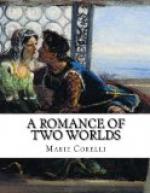Left alone, I gazed in bewilderment at the loveliness round me. The walls and ceiling were painted in fresco. I could not make out the subjects, but I could see faces of surpassing beauty smiling from clouds, and peering between stars and crescents. The furniture appeared to be of very ancient Arabian design; each chair was a perfect masterpiece of wood-carving, picked out and inlaid with gold. The sight of a semi-grand piano, which stood open, brought me back to the realization that I was living in modern times, and not in a dream of the Arabian Nights; while the Paris Figaro and the London Times—both of that day’s issue—lying on a side-table, demonstrated the nineteenth century to me with every possible clearness. There were flowers everywhere in this apartment—in graceful vases and in gilded osier baskets—and a queer lop-sided Oriental jar stood quite near me, filled almost to overflowing with Neapolitan violets. Yet it was winter in Paris, and flowers were rare and costly.
Looking about me, I perceived an excellent cabinet photograph of Raffaello Cellini, framed in antique silver; and I rose to examine it more closely, as being the face of a friend. While I looked at it, I heard the sound of an organ in the distance playing softly an old familiar church chant. I listened. Suddenly I bethought myself of the three dreams that had visited me, and a kind of nervous dread came upon me. This Heliobas,—was I right after all in coming to consult him? Was he not perhaps a mere charlatan? and might not his experiments upon me prove fruitless, and possibly fatal? An idea seized me that I would escape while there was yet time. Yes! ... I would not see him to-day, at any rate; I would write and explain. These and other disjointed thoughts crossed my mind; and yielding to the unreasoning impulse of fear that possessed me, I actually turned to leave the room, when I saw the crimson velvet portiere dividing again in its regular and graceful folds, and Heliobas himself entered.
I stood mute and motionless. I knew him well; he was the very man I had seen in my third and last dream; the same noble, calm features; the same commanding presence; the same keen, clear eyes; the same compelling smile. There was nothing extraordinary about his appearance except his stately bearing and handsome countenance; his dress was that of any well-to-do gentleman of the present day, and there was no affectation of mystery in his manner. He advanced and bowed courteously; then, with a friendly look, held out his hand. I gave him mine at once.
“So you are the young musician?” he said, in those warm mellifluous accents that I had heard before and that I so well remembered. “My friend Raffaello Cellini has written to me about you. I hear you have been suffering from physical depression?”




